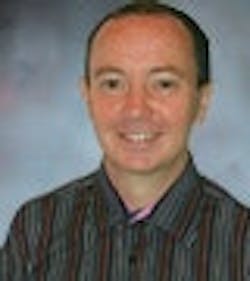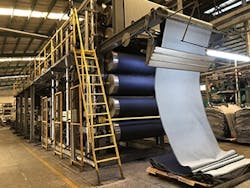Blue Jean Dye Process Goes Green
[pullquote]
Denim fabric used in clothing such as trousers, overalls and dungarees started out specifically for use as durable workwear for people with very physical jobs in mines, factories and fields.
The idea came to Reno, Nevada, tailor Jacob Davis after a customer complained that his pockets kept ripping. Davis recruited Levi Strauss, owner of dry goods wholesaler Levi Strauss & Co. as a business partner and together they obtained a patent on May 20, 1873, to manufacture the new material.
Today, according to Research and Markets, Dublin, consumers in the United States purchase 450 million pairs of the two billion pairs manufactured every year.
Converting raw cotton into finished jeans involves multiple energy-intensive process steps. First, the cotton is spun into a yarn. Up to 4,500 cotton threads are then simultaneously pre-wetted and degreased with a chemical cleaner in several preparation baths. Then, the dyeing process begins with yarn fiber immersed in the first indigo dyeing bath.
However, natural indigo (C16H10N2O2) isn’t water soluble and exists in an agglomerated form. As such, it can’t penetrate the fiber material. Separating the agglomerated molecules to make them water soluble is necessary – and is achieved by reducing the double-bonded oxygen in the molecule with sodium hydrosulfite. This, in turn, causes indigo molecules to take up a negative charge, making them soluble in water, but also changes their color to yellow. The dispersed molecules now settle on the surface layer of the cotton fiber. Yarn fibers are then exposed to atmospheric oxygen which oxidizes the indigo, returning it to its blue color.
For intensive dyeing and a unified color, the cotton passes through anywhere from 6–15 consecutive dyeing vats because the fiber only slowly absorbs the indigo molecules. Each pair of completed jeans uses about 11,000 liters of water during production.
Figure 1. Tuong Long manufactures 18 million meters/yr of fabric at its Ho Chi Minh City facility in Vietnam. Source: Tuong Long.
The next step is to remove the chemicals previously used for cleaning and reduction reactions, as well as any unbonded indigo. This results in large volumes of blue water contaminated with sulfites and aniline, with the latter a pre-cursor chemical for the synthetic indigo dyes mostly used today. Aniline is hazardous and has started appearing on the restricted substance lists of some major clothing brands and retailers. Agencies responsible for public health around the world are closely scrutinizing the chemical.
In addition, denim production lines, which can be over half a mile long, produce a lot of cotton waste.
Not surprisingly, efforts are underway to make the process more sustainable. One company, Archroma, Reinach, Switzerland, has been pioneering new techniques as part of its Advanced Denim technology, among them, replacing indigo-based dyes with sulfur-based ones instead.
In chemical terms, the two processes are quite similar. However, sulfur dyes contain both oxygen groups and sulfur-containing functional groups called thiols. In the first step, as with indigo, the dye molecule is reduced, causing it to dissolve in water and change color. In the following oxidation process, the dye is attached to the fibers using bi-cationic agents. This fixes the final color.
The company’s concentrated sulfur dyes have a high affinity for cotton and only require a single dyeing box. One sugar-based reducing agent is needed to obtain a medium color intensity. All other process steps are eliminated.
According to Archroma, this new process reduces water consumption by 92%, energy use by 30% and cotton waste by 87%.
The company has also launched a new range of aniline-free dyes: Diresul Smartdenim Blue, an aniline-free liquid sulfur blue dye designed to mimic indigo when used with its Advanced Denim technology; and Denisol Pure Indigo liquid dye.
In June, textile manufacturer Tuong Long, Ho Chi Minh City, Vietnam, became the first denim manufacturer in Vietnam to switch 100% of its production to the Denisol Pure Indigo product. The company employs 600 people and manufactures 18 million m/yr of fabric — mostly denim — for markets in the Far East, Europe and the USA.
“Tuong Long is engaged to manufacturing denim and khakis fabrics in a cleaner way,” comments Dieu Tuong, production manager at Tuong Long. “We then realized that Archroma’s Denisol Pure Indigo actually is an indigo dye and as such performs just as conventional indigo — and we decided to switch 100% of our production to it.”
Seán Ottewell is Chemical Processing's Editor at Large. You can email him at [email protected].


